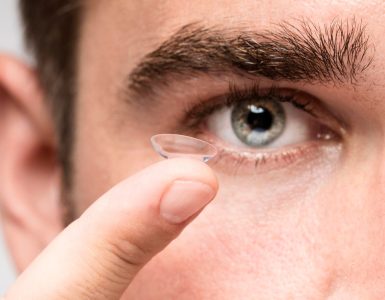Computer, smartphone and tablet usage has been steadily increasing over the years. However, the events of the last couple of years has caused a dramatic shift towards the use of digital devices with enormous numbers of people changing to working from home and school classes going on-line. It is therefore timely to have a think about how all this extra and prolonged screen time may be affecting our eyes.
What is Computer Vision Syndrome?
Spending excessive hours in front of your screen can increase your risk of digital eye strain. Because the text on your screen is created by pixels and is not therefore not as defined as printed text, it is harder on your eyes that reading print. When working on your computer your eyes need to focus and refocus and are constantly moving requiring a lot of effort from your eye muscles. Add to that issues with glare, posture, blinking less, uncorrected vision problems and lack of breaks, it is understandable that many people are experiencing symptoms of eye strain. Symptoms of Computer Vision Syndrome can include:
- Blurred or double vision
- Difficulty focussing
- Dry, itchy, red, burning or watery eyes
- Tired eyes
- Headaches
- Neck and shoulder pain
What can cause Computer Vision Syndrome?
There are various things that can contribute to the chances of you suffering from eye strain, such as:
- Spending more than two hours in a row looking at a digital screen without a break
- Blinking less frequently
- Looking at a digital screen every day
- Incorrect prescription glasses
- Glare on the screen
- Unsuitable lighting in the room
- Incorrect posture
- Poorly set up work space
- Underlying eye problems
What about blue light?
There has been a lot talked about recently regarding the effects of blue light. All the devices we use such as phones, laptops, computers, tablets, tv, etc., emit a strong blue light, which is created artificially. These blue-light wavelengths produce high amounts of energy and can be harmful if we are over-exposed to them, especially if we look at them in the dark or for excessive amounts of time. This can not only strain the eyes, but also has the potential to damage the retina. It can also interfere with your natural sleep cycle with excessive exposure to blue light in the evening suppressing the body’s production of melatonin, the hormone that helps you to sleep.
What can we do to prevent eyestrain?
There are procedures and changes you can put into place to create a better work environment, help manage your screen time, and prevent eye strain:
- Rest your eyes. Take 15 minutes after each two hours of computer time to rest your eyes for 15 minutes by doing non-screen tasks.
- Blink Often. Be conscious of how often you are blinking.
- Reduce glare on the screen. Adjust the lighting in the room or add a screen glare filter.
- Adjust screen brightness. Ensure your screen brightness relates to your surroundings and is not too bright.
- Maintain good posture. Sit up straight in a supportive chair that is set at the correct height.
- Correct computer positioning. Ensure your screen is the correct distance from your eyes (an arms-length is recommended) and positioned slightly below eye level.
- Get an eye health check. Your optometrist will be able to check your prescription is current or if you have any undiagnosed eye conditions.
- Refocus your eyes. Follow the 20-20-20 rule. Every 20 minutes look at something 20 feet away for 20 seconds.
- Use eye drops. If your eyes are dry or irritated, over-the-counter eye drops will help to keep them lubricated.
- Adjust the light settings on your phone at night. Adjust your phone settings to allow it to emit a warmer light at night.
As with anything prevention is better than cure! Even if you may not be suffering from any of the symptoms of Computer Vision Syndrome, putting into place the guidelines above will help ensure happy and safe work and play on any of your digital devices by protecting the health your eyes.
If you have any concerns at all about how your screen time is affecting your eyes and your vision, ensure you arrange an appointment with your optometrist for an eye examination.




